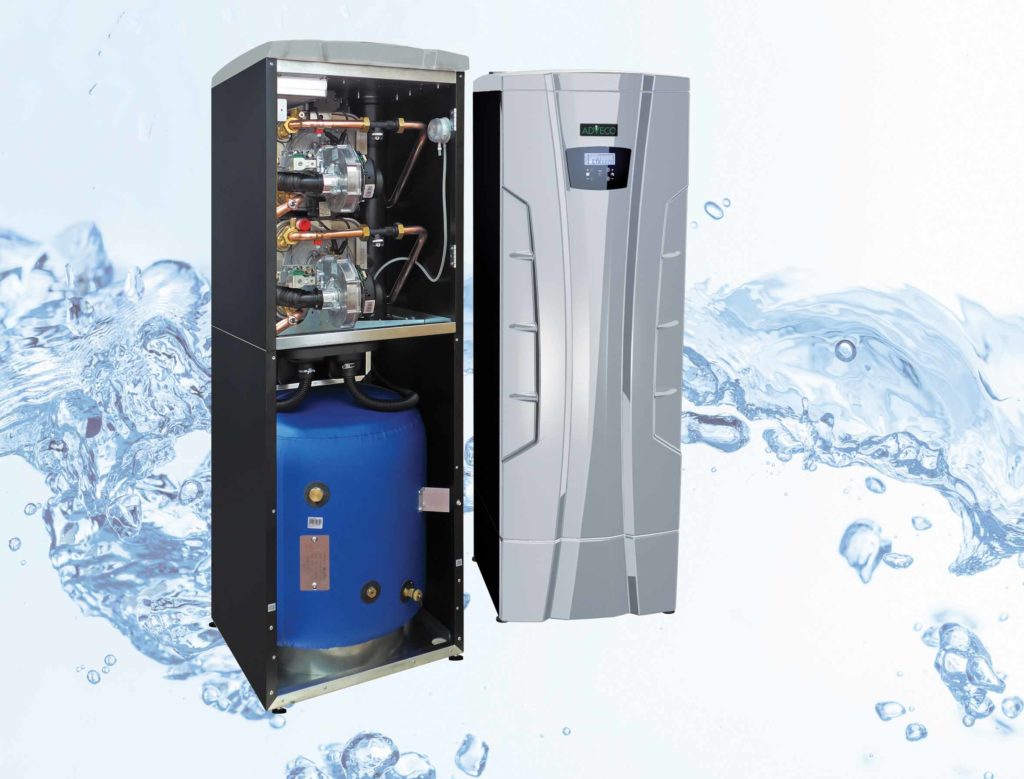For more than fifty years, Adveco has been a leading innovator in the provision of hot water (DHW) for commercial scale projects across the UK. Today its focus is shifting to encompass a blend of traditional and new, more sustainable technologies in the form of solar thermal and especially heat pumps to integrate greater sustainability into DHW systems.
With a predicted one-third rise in non-domestic floor space by 2050, much of the current focus resides on new builds, but this still leaves more than 1.6 million pre-existing non-domestic buildings in England and Wales, generating almost one-fifth of the UKís carbon emissions, needing expert, practical support.
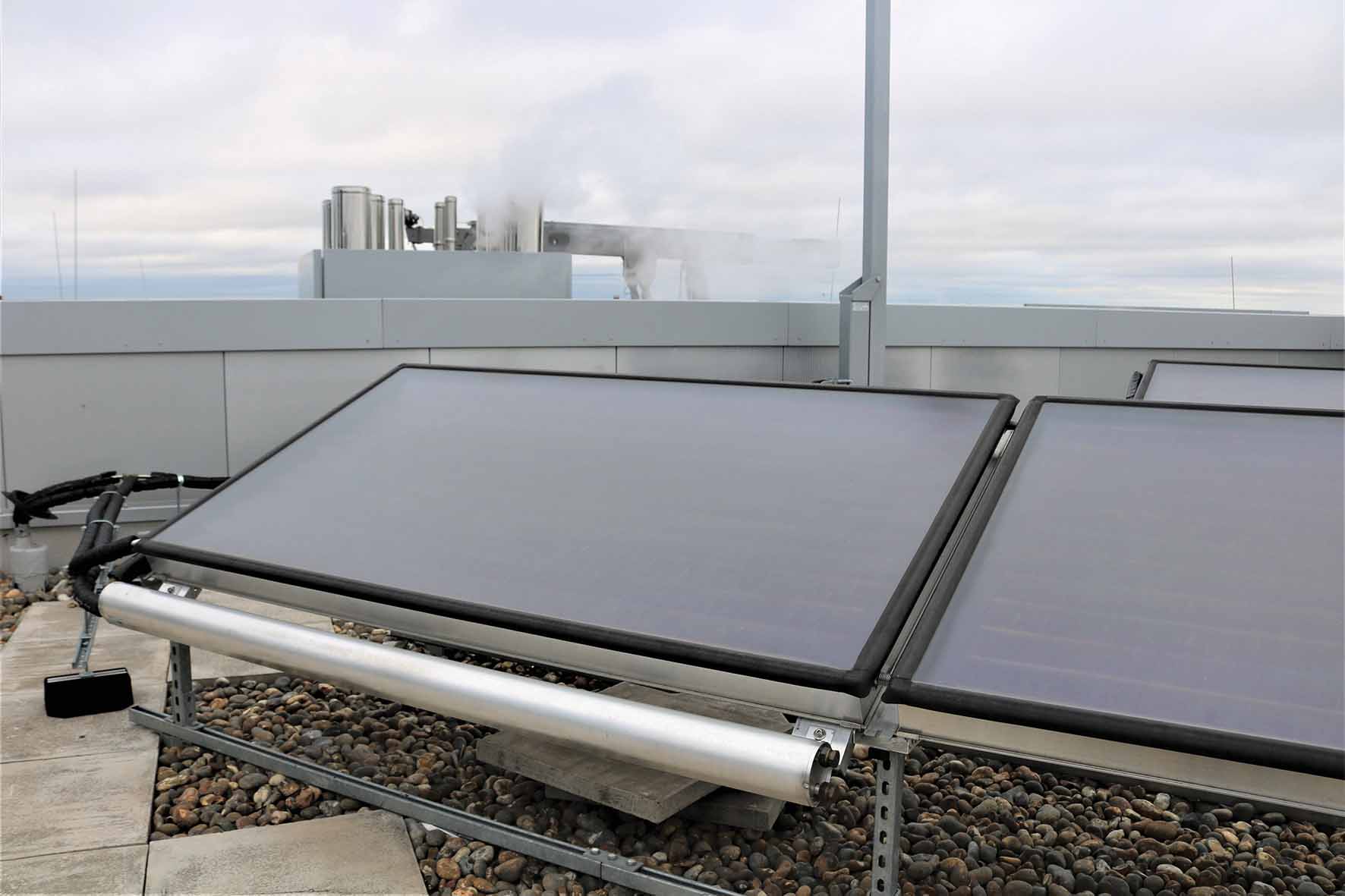
Air source heat pumps (ASHP) have become the poster child technology for the governmentís net zero strategy. The advantage of ASHPs is that, with a performance greater than 100%, they can extract additional energy from outside of the buildingís metered systems delivering significant carbon savings. For a commercial DHW system, it is recommended that a working water temperature from the ASHP, such as Advecoís FPi32 or L70, must be at least 55∞C. This is certainly attainable from current generation ASHPs when deployed in a hybrid approach. This uses the ASHP as preheat and combines it with either gas-fired or more preferably an electric top-up to achieve the required hot water temperature. This is where the additional system complexity and cost can creep in. But by correctly balancing a system through a mix of physical spacing in the vessel and system monitoring with dedicated controls, as developed for the Adveco FUSION, the system no longer fights itself, working seamlessly to deliver the highest operational efficiencies
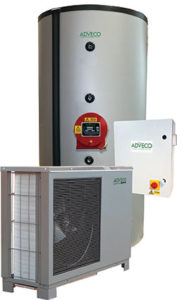 In line with European Commission proposal for a tightening of F-Gas regulations, development work continues at pace to support introduction of R290, or propane as it is more commonly known, as a new refrigerant offering a coefficient of performance (COP) that should enable working flow temperatures from an ASHP of up to 75∞C and potentially much higher. This means future commercial systems can be less complex, without the need for additional electric immersion for high-temperature flushing for legionella protection. That said, immersions or more likely electric boilers will continue to be specified to provide system redundancy ensuring business-critical DHW demands are met.
In line with European Commission proposal for a tightening of F-Gas regulations, development work continues at pace to support introduction of R290, or propane as it is more commonly known, as a new refrigerant offering a coefficient of performance (COP) that should enable working flow temperatures from an ASHP of up to 75∞C and potentially much higher. This means future commercial systems can be less complex, without the need for additional electric immersion for high-temperature flushing for legionella protection. That said, immersions or more likely electric boilers will continue to be specified to provide system redundancy ensuring business-critical DHW demands are met.
Together, these technologies offer a potential development arc for existing commercial properties that are currently on-gas, but there also remain other more traditional options that can more cost effectively enable businesses to begin a net zero transition. The governmentís Heating & Buildings Strategy puts in place a process to phase out installation of new natural gas boilers from 2035, with a caveat that the costs of investing in low-carbon alternatives have been suitably reduced. There is also to be a consideration for replacing natural gas with alternative low-carbon fuels, whether biomethane or hydrogen injection into the gas supply.
The government has already committed to enabling the blending of hydrogen in the gas grid and it is also worth noting that the latest generation of direct-fired condensing water heaters and boilers should already be able to support initial 20% hydrogen/natural gas blend.
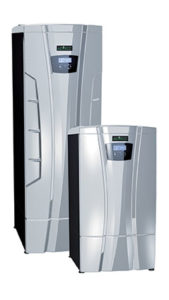
Though limiting new gas grid connections for heating systems becomes effective this year, this mandate does not apply to already connected buildings. For the time being, if a business uses gas, then it can upgrade to new gas appliances up until 2035, with 100% hydrogen-ready options extending that window well into the 2040s based on current appliance lifespan.
If upgrading a boiler of water heater, you can still specify, for the next ten years, a condensing gas-fired appliance without fear of breaching new regulations, so long as the new unit is more efficient than the unit being replaced. This provides a safety net while assessing new technology options prior to the 2035 deadline. It would also be well worth considering the implementation of solar thermal preheat for gas-fired systems if you wanted to make sustainability commitments with proven and genuinely renewable technology.
Recognising this need for more efficient gas-fired water heaters to bridge the technology gap for existing commercial properties, Adveco has developed two new ranges of direct-fired condensing water heaters ñ the AD and the ADplus. Both ranges provide a compact, floor-standing design that is easy to introduce into an existing plant room. The AD range, with 70-280 kW variants is conceived to be used with a buffer for high demand semi-instantaneous hot water applications in sports & leisure centres, hotels, spas, schools, stadia, and large commercial buildings. The ADplus range, with 70-140kW variants additionally incorporates an integrated 120-litre stainless steel water storage tank. This enables the ADplus to serve as a semi-storage system, providing always available and instantaneous supply with quick recovery times for large-scale continuous provision of DHW.
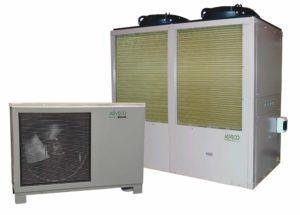 The Fecralloy burner, with excellent functionality at extremely high temperatures exhibits a high modulation ratio resulting in improved combustion efficiency meaning the burner requires less gas. This condensing technology delivers up to 30% savings in fuel consumption, making it more cost-effective, while reducing emissions. For smaller on-demand needs, ADplus heats only what is what is necessary, with no ignition for smaller withdrawals providing considerable additional energy savings. Both AD and ADplus as a result exhibit ultra-low NOX (Class 6 appliance at 27 mg/kWh) and CO emissions (19ppm).
The Fecralloy burner, with excellent functionality at extremely high temperatures exhibits a high modulation ratio resulting in improved combustion efficiency meaning the burner requires less gas. This condensing technology delivers up to 30% savings in fuel consumption, making it more cost-effective, while reducing emissions. For smaller on-demand needs, ADplus heats only what is what is necessary, with no ignition for smaller withdrawals providing considerable additional energy savings. Both AD and ADplus as a result exhibit ultra-low NOX (Class 6 appliance at 27 mg/kWh) and CO emissions (19ppm).
The water heaters all feature either a single or multiple heat exchangers for built-in redundancy. Constructed from a tough, continuous run of AISI 316Ti titanium-stabilised stainless steel, they are a perfect response to counter corrosion typically seen in high pressure circuits in soft, or softened water applications.
As well as the continuity of service seen in individual units, the AD is perfect for integrating into large scale heat pumps systems. So long as there is an existing gas connection, AD can be used to provide a cost-effective and easy to accommodate back-up for assured continuity of business-critical water heating.

